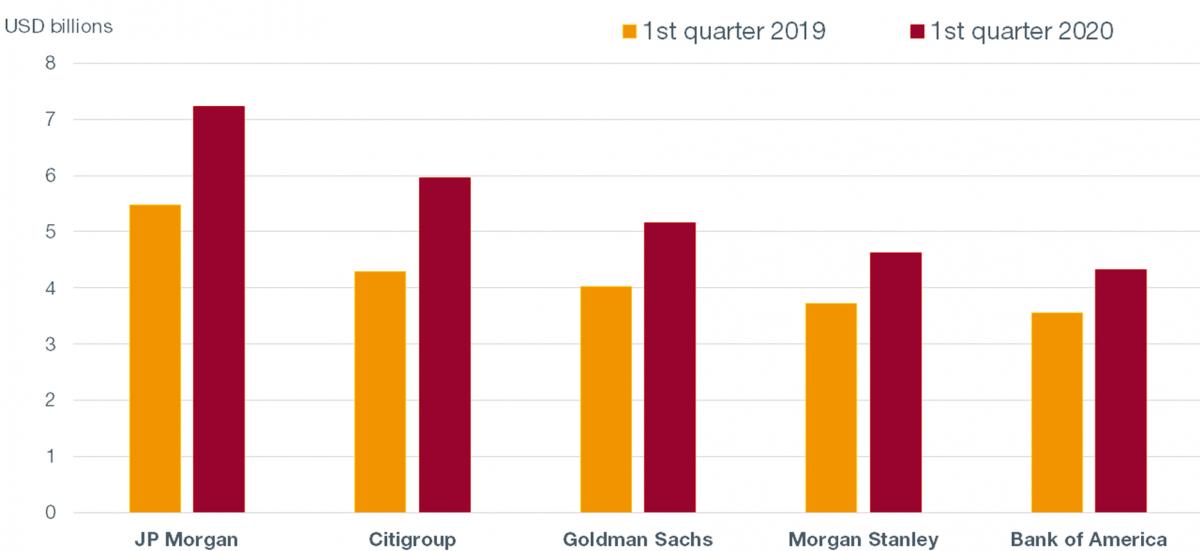
L’actualité économique et financière vous intéresse ?
La banque Bonhôte est heureuse de vous accueillir et de mettre à votre disposition ses experts en matière d’actualité financière.


| USD/CHF | EUR/CHF | SMI | EURO STOXX 50 | DAX 30 | CAC 40 | FTSE 100 | S&P 500 | NASDAQ | NIKKEI | MSCI Emerging MArkets | |
|---|---|---|---|---|---|---|---|---|---|---|---|
| Latest | 0.97 | 1.05 | 9'612.83 | 2'888.30 | 10'625.78 | 4'499.01 | 5'786.96 | 2'874.56 | 8'650.14 | 19'897.26 | 901.31 |
| Trend | |||||||||||
| %YTD | 0.00% | -3.10% | -9.46% | -22.88% | -19.80% | -24.74% | -23.27% | -11.03% | -3.59% | -15.89% | -19.14% |
Globally, new cases of virus infections have increased by 2.3% in the past 24 hours, resulting in a total of 2.4 million cases worldwide. In the US, cases have risen by 3.3% to 750,000 while the slowdown in the growth rate to 1.7% in Italy offers a glimmer of hope. Exit strategies are taking shape but the approach will have to be ‘step by step’. In the US, this would require carrying out more than 4.5 million tests per month, according to medical authorities. Trump’s hope of a ‘big bang’, whereby 29 states would be able to reopen for business in the near future, seems unrealistic. A second wave is feared everywhere, as seen in Singapore last week. Some European countries have even extended their lockdowns.
The past week has yielded more evidence about the economic damage inflicted by pandemic-related business shutdowns. The question now is what might change as the restrictions are gradually loosened. It is possible that consumers will not behave in the same way as before the crisis, for example eating out less often (as is currently the case in China) or cutting back on travelling.
In equity markets, the dichotomy remains intact between those companies that investors believe will soon be out of the woods – and all the others. Blue chips continued recovering last week while small and mid-caps are still lagging behind on the whole. Investors may breathe a sigh of relief when a colossus like Amazon rises to an all-time high. But the situation is just the opposite for banking and automotive stocks. In Europe, car sales plunged by 55% in March year on year. By comparison, the same downswing had been ‘just’ 27% in 2009. The oil industry is also buckling after the price of WTI (the US benchmark) plummeted below USD 15 per barrel on the back of low demand and abundant reserves.
Credit spreads have narrowed significantly in recent weeks. The Fed is planning to buy USD 750 billion in corporate bonds, including bonds rated as ‘investment grade’ as at 22 March (which were subsequently cut to double-B) as well as high-yield ETFs. Concerning individual bonds, we advise investors to be highly selective, distinguishing between those issuers which simply have liquidity problems (and which will be helped by this Fed programme) and those that, despite everything, could become insolvent.
Results reported by major US banks for the first quarter of 2020 point to ongoing profitability, though obviously down sharply on the year-earlier period. These banks also took a hit from the coronavirus pandemic, especially those for which retail banking is a large chunk of their revenues (JP Morgan, Wells Fargo, Citigroup and Bank of America). Sizable provisions were set aside to deal with the surge in late (or non-) payments and non-performing loans in regard to households and businesses. Investment banks such as Goldman Sachs or Morgan Stanley have been somewhat more resilient.
For example Citigroup, a major part of whose business is credit cards, posted a 12% increase in first-quarter revenues. But its earnings plunged by 46% to USD 2.4 billion after it had to set aside USD 7 billion for present and expected loan losses. But after years of low volatility in which they significantly underperformed, the trading desks have emerged as an ‘eldorado’ for banks. Brokerages earned on commodities, forex, equites and fixed income sent trading revenues surging in the first quarter (see chart), helping to offset losses at other divisions such as asset management. Citigroup’s trading revenues rocketed by 39% to USD 5.9 billion, shattering expectations. At Goldman Sachs, the increase for this line item was 28%, up at USD 5.16 billion. The bad news is that volumes are expected to fall back in the coming months.
Overall, guidance for the second quarter is gloomy. This certainly does not bode well for European banks, which will report their figures in early May. The global economic system has taken such a pounding that the impact on future operating revenues is hard to project.

Download the Flash boursier (pdf)
This document is provided for your information only. It has been compiledfrom information collected from sources believed to be reliable and up to date, with no warranty as to its accuracy or completeness.By their very nature, markets and financial products are subject to the risk of substantial losses which may be incompatible with your risk tolerance.Any past performance that may be reflected in this documentis not a reliable indicator of future results.Nothing contained in this document should be construed as professional or investment advice. This document is not an offer to you to sell or a solicitation of an offer to buy any securities or any other financial product of any nature, and the Bank assumes no liability whatsoever in respect of this document.The Bank reserves the right, where necessary, to depart from the opinions expressed in this document, particularly in connection with the management of its clients’ mandates and the management of certain collective investments.The Bank is a Swiss bank subject to regulation and supervision by the Swiss Financial Market Supervisory Authority (FINMA).It is not authorised or supervised by any foreign regulator.Consequently, the publication of this document outside Switzerland, and the sale of certain products to investors resident or domiciled outside Switzerland may be subject to restrictions or prohibitions under foreign law.It is your responsibility to seek information regarding your status in this respect and to comply with all applicable laws and regulations.We strongly advise you to seek independentlegal and financial advice from qualified professional advisers before taking any decision based on the contents of this publication.